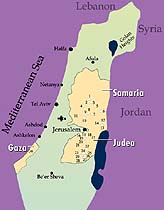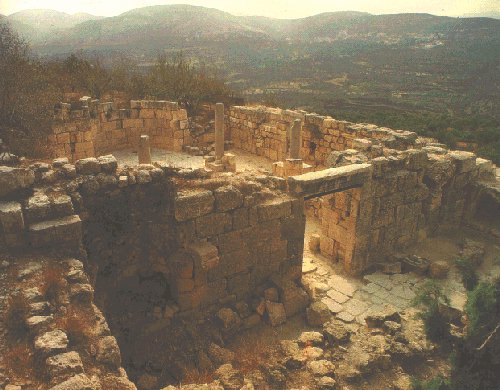HOME / Table of Contents = Civilizations - Cultures - Areas - Regions - Prehistory
Other Archaeological Sites / The Neolithic of the Levant (500 Page Book Online)
McDonald Ancient Near East Book Auction Ad Infinitum
Ancient Samaria (Hebrew Shomron)

Easton's 1897 Bible Dictionary: Samaritans
2 Kings 17:24: And the King of Assyria brought men from Babylon and from Cuthah, and from Ava, and from Hamath, and from Sepharvaim, and placed them in the cities of Samaria instead of the children of Israel: and they possessed Samaria, and dwelt in the cities thereof ......
instead of the original inhabitants whom Sargon (BC 721) had removed into captivity ......
18:9 And it came to pass in the fourth year of King Hezekiah, which was the seventh year of Hoshea son of Elah king of Israel, that Shalmaneser king of Assyria came up against Samaria and besieged it.
18:10 And at the end of three years they took it: even in the sixth year of Hezekiah, that is the ninth year of Hoshea king of Israel, Samaria was taken.
18:11 And the king of Assyria (Sargon) did carry away Israel unto Assyria and put them in Halah and in Habor by the river of Gozan and in the cities of the Medes:
18:12 Because they obeyed not the voice of the LORD their God but transgressed his covenant and all that Moses the servant of the LORD commanded and would not hear them nor do them ......
2 Kings 18:9-12 [Listen With Real Player]
These strangers amalgamated with the Jews still remaining in the land and gradually abandoned their old idolatry and adopted partly the Jewish religion. After the return from the Captivity the Jews in Jerusalem refused to allow them to take part with them in rebuilding the temple and hence sprang up an open enmity between them. They erected a rival temple on Mount Gerizim which was, however, destroyed by a Jewish king (BC 130). They then built another at Shechem. The bitter enmity between the Jews and Samaritans continued in the time of our Lord: the Jews had "no dealings with the Samaritans". Our Lord was in contempt called "a Samaritan". Many of the Samaritans early embraced the gospel. Of these Samaritans there still remains a small population of about one hundred and sixty who all reside in Shechem where they carefully observe the religious customs of their fathers. They are the "smallest and oldest sect in the world" ......
Easton's Bible Dictionary (Hypertext Webster Gateway)
Easton's Bible Dictionary (Bible Study Tools Net)
Smith's Bible Dictionary (Bible Study Tools Net)

Easton's 1897 Bible Dictionary: Samaria
Hypertext Webster Gateway / Bible Study Tools Net
Samaria: a watch mountain or a watch tower. In the heart of the mountains of Israel a few miles northwest of Shechem stands the "Hill of Shomeron". It is an oblong hill with steep but not inaccessible sides and a long flat top. Omri, the king of Israel, purchased this hill from Shemer its owner for two talents of silver and built on its broad summit the city to which he gave the name of "Shomeron" (Samaria) as the new capital of his Kingdom instead of Tirzah ......
1 Kings 16:24: And he bought the hill Samaria of Shemer for two talents of silver and built on the hill and called the name of the city which he built, after the name of Shemer, owner of the hill, Samaria ......
As such it possessed many advantages. Here Omri resided during the last six years of his reign. As the result of an unsuccessful war with Syria he appears to have been oblige to grant to the Syrians the right to "make streets in Samaria" or probably permission to the Syrian merchants to carry on their trade in the Israelite capital. This would imply the existence of a considerable Syrian population. It was the only great city of Palestine created by the sovereign. All the others had been already consecrated by patriarchal tradition or previous possession. But Samaria was the choice of Omri alone. He gave to the city which he had built the name of its former owner but its special connection with himself as its founder is proved by the designation which it seems Samaria bears in Assyrian inscriptions (Beth-Khumri or "the house or palace of Omri". Samaria was frequently besieged. In the days of Ahab, Benhadad II came up against it with thirty two vassal kings but was defeated with a great slaughter ......
1 Kings 20:1-21 [Listen With Real Player]
A second time next year he assailed it; but was again utterly routed and was compelled to surrender to Ahab ......
1 Kings 20:28-34 [[Listen With Real Player]
whose army as compared with that of Benhadad was no more than "two little flocks of kids". In the days of Jehoram this Benhadad again laid siege to Samaria, during which the city was reduced to the direst extremities. But just when success seemed to be within their reach, they suddenly broke up the seige, alarmed by a mysterious noise of chariots and horses and a great army, and fled, leaving their camp with all its contents behind them. The famished inhabitants of the city were soon relieved with the abundance of the spoil of the Syrian camp; and it came to pass according to the word of Elisha that "a measure of fine flour was sold for a shekel and two measures of barely for a shekel in the gates of Samaria" ......
2 Kings 7:1-20 [Listen With Real Player]
Shalmaneser invaded Israel in the days of Hoshea and reduced it to vassalage. He laid siege to Samaria (BC 723), which held out for three years, and was at length captured by Sargon, who completed the conquest Shalmaneser had begun, and removed vast numbers of the tribes into captivity. This city, after passing through various vicissitudes, was given by the emperor Augustus to Herod the Great, who rebuilt it, and called it Sebaste (Greek form of Augustus) in honour of the emperor. It is now represented by the hamlet of Sebustieh, containing about three hundred inhabitants. The ruins of the ancient town are all scattered over the hill, down the sides of which they have rolled. The shafts of about one hundred of what must have been grand Corinthian columns are still standing, and attract much attention although nothing definite is known regarding them. In the time of Christ, Western Palestine was divided into three provinces, Judea, Samaria, and Galilee. Samaria occupied the centre of Palestine. It is called in the Talmud the "land of the Cuthim" and is not regarded as a part of the Holy Land at all. It may be noticed that the distance between Samaria and Jerusalem, the respective capitals of the two kingdoms, is only 35 miles in a direct line ......
Other Online Links

Samaria: Collection of Links : Alexander Kaplunovsky
"Samaria the City" in Smith's Bible Dictionary
(Bible Study Tools)
"Samaria the Country" in Smith's Bible Dictionary
(Bible Study Tools)
Hypertext Webster Gateway / Bible Study Tools Net
Smith's Bible Dictionary: Samaritan Pentateuch
(Bible Study Tools Net)

The History of the Ancient Near East Electronic Compendium